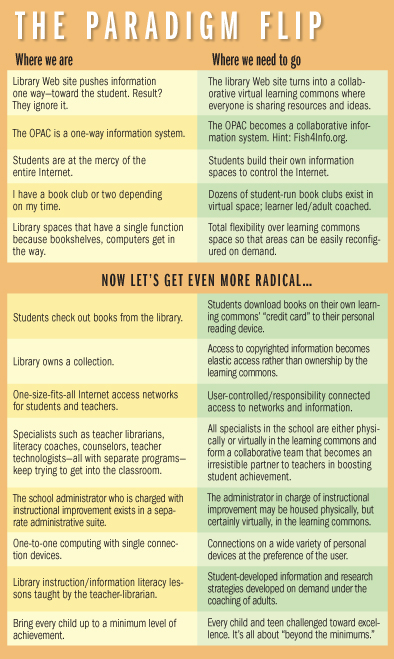We need a reboot. We need a build out. We need a buildup. We need a national makeover. That is why the next few months are among the most important in U.S. history. Because of the financial crisis, Barack Obama has the bipartisan support to spend $1 trillion in stimulus. But we must make certain that every bailout dollar, which we’re borrowing from our kids’ future, is spent wisely.
… It has to go into training teachers, educating scientists and engineers, paying for research and building the most productivity-enhancing infrastructure — without building white elephants…
Develop Your Technology Skills
Is Visuality the New Literacy?
The rich databases of component images form a new grammar for moving images… After all, this is how authors work. We dip into a finite set of established words, called a dictionary, and reassemble these found words into articles, novels and poems that no one has ever seen before. The joy is recombining them. Indeed it is a rare author who is forced to invent new words. Even the greatest writers do their magic primarily by rearranging formerly used, commonly shared ones. What we do now with words, we’ll soon do with images.
Below a TimeTube mashup creates a genealogy of most popular user-generated videos tagged Global Warming.
Transforming Information Flow in School Libraries
"learning commons – both a physical and a virtual space that’s staffed not just by teacher-librarians but also by other school specialists … such as literacy coaches, teacher technologists, teacher-librarians, art teachers, music teachers, and P.E. teachers…"
The main objective of the open commons is to showcase the school’s best teaching and learning practices… a typical classroom assignment and library Web site are examples of one-way communication. Adults tell learners what to do, how to do it, and where to find information. But in the new learning commons, homework assignments and library Web sites offer two-way communication.
… Having done that, note that you have created a revolution in thinking. Directive adults have been transformed into coaches; direct teaching has been transformed into collaborative inquiry.
21st Century Skills or Adequate Yearly Progress?
The Boston Globe (October 30, 2008) recently reported on efforts to redirect district curriculum to "skills the district has deemed necessary for survival in the 21st century, including critical thinking, invention, problem-solving, and multicultural collaboration."
"Accountability is a good thing. Learning standards are a good thing. But is focusing on one test a fair measure of student success? I think that answer is, 'No,' " said Laura Salomons, a School Committee member since May and a mother of four.
Salomons has submitted a proposal that seeks community support for allowing teachers to avoid tailoring their lessons to the MCAS. Instead, she would like to see teachers directed to instruct students on skills the district has deemed necessary for survival in the 21st century, including critical thinking, invention, problem-solving, and multicultural collaboration.
"I have come to the conclusion that we, as a school district, may be overly consumed with doing well on MCAS," Salomons began in her eight-page proposal. "The focus is a detriment to reaching the school committee and superintendent's goal of 'providing students with . . . learning opportunities that encourage lifelong learning skills and that support a student's artistic, social, emotional and physical development.' " More
I find that I rarely get asked to do staff development to "bring the scores up." Increasingly I'm asked to help teachers create more engaging learning environments for students.
While NCLB began with the admirable goal of narrowing demographic performance gaps and putting an end to sorting kids on the “bell curve,” it may be doing just the opposite. Many of our schools are now compelled to force feed the content required for “adequate progress” as measured by standardized state tests. Does test prep = academic "feed-lot?"
Too little time is left for student-centered, project-based learning that allows students to work at the upper level of Bloom. Innovation requires much trial and error (Bloom’s evaluation). Learning to self-assess your problem solving approach is not a skill fostered in multiple-choice test-prep environment.
NCLB correctly put the focus on student achievement. Our students will need a strong foundation in core concepts. But schools can’t be filled with routine tasks. They need to be fluid environments focused on helping students take responsibility for thinking and problem solving where there sometimes isn’t a right answer.

